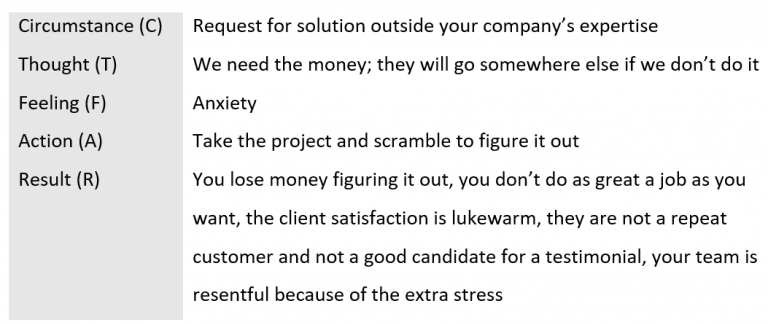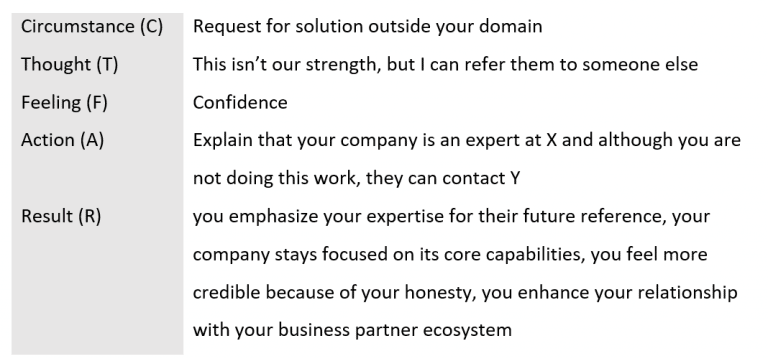“If I have lots of services and work with many types of customers, I’m more diversified. It’s safer.” I hear this a lot and I remember when I used to believe this too. I also believed that I should never turn away work, or I would be sorry later. Then I discovered that these two beliefs were hurting the value of my business and making it difficult to scale.
The main problem was the bigger we got, the harder it was because each client was different and what they wanted was different. Sometimes even within the client’s organization, there was a lack of alignment around the definition of done and what success looked like. My business and my team were being sucked into the client’s ecosystem. They weren’t coming into ours.
Plus we were wasting a lot of time writing complicated proposals, and it was difficult to predict how long an engagement would take. So much depended on how quickly the client could understand and apply what we were delivering – and how do you estimate THAT? I just kept hiring more (expensive) staff, throwing them into the mix and trying to scale with people, which is difficult.
Because we did many different things for many types of customers, it was difficult to do all of them well. Also, when I took on a project I didn’t want to do because I was afraid to turn away business, I was reinforcing the belief that there was not enough work available, perpetuating a scarcity mindset instead of a growth mindset.
Become a leader in a niche market.
Being a leader in a niche market is one of the best ways to ensure your business is an asset. Why is that so important? Because although you may not want to sell your business now, building a business that’s an asset should always be your goal because then you have options. You can scale it, sell it, pass it down, or take on the chairman role and become an investor removed from the day-to-day. And the most valuable kind of business is one that can run without you, that’s a leader in a niche market, with positive cashflow and consistent recurring revenue that comes from solutions, not services.
When you’re crystal clear who your business serves, you can describe their situation and their problems with amazing accuracy. It will seem to your customers that you are one of them because you use their language. When your customers believe you completely understand them, they trust you. Then when you explain how your solution addresses their issues and problems, you can communicate the value so well that they will want to work with you. You can do this authentically when you specialize in a niche because you know exactly how to add value. It becomes your company’s domain of expertise.
Be a premium provider.
It may seem counterintuitive but the best way to turn your business into an asset is to constrain your focus, narrow your target market and carve out a niche. The narrower the niche, the better because it allows you to differentiate your business in the market. In fact, the single most important factor that determines the value of your business is your market differentiation.
The reason you want to be different is because when your business and solutions are unique, by definition that means no one else is providing your exact solutions. That means you can charge a premium. When you charge a premium, you increase your profit, which gives you more money for marketing. When you have more money for marketing, you can spend it to let more customers know how different and better your solutions are. It’s the ultimate virtuous circle. It’s not only more fulfilling and more profitable, but it also leads to higher client (and staff) satisfaction.
Find the intersection between what your clients value the most and what your company is best at doing and focus on that exclusively. You could be delivering things that you think are important but are not valued by your target market. Is speed, quality, or price the most important thing to them? If you don’t know, find out by asking your existing clients why they hired your company and analyze what they have in common.
A company that’s a leader in a niche market is more valuable and will command a higher sale price than a company with a broad and diverse customer base. This is because of the complexity involved and the challenges in staffing to provide those services.
Companies that are easy to run are easier to sell. If your company is not easy to run, then selling it is likely to be difficult, too. You might not have thought of it this way before, but ask yourself this question: If no one would want to buy my company, then why would I want to own it?
It can be scary to turn down business because of what we make it mean. But once you narrow your focus, the intense satisfaction that comes from developing deep expertise can be yours. The clarity and focus that come from understanding your niche fuels your team and creates synergy because everyone is on the same page.
Less is more: the value of the constraint
Business owners tell me they must take any work to pay the bills. But when you constrain time or space (or anything), you cut the fluff and keep what matters. You take what remains and make it the best and then you market that. For example, a consulting company that tries to handle IT, HR, and operations for healthcare providers, government contractors, and financial services firms can be stretched so thin that both staff and clients are unhappy. Staff starts to burn out and quality is inconsistent across each service area.
Yes, you can have a team of superstars with deep expertise in a given area and assign them to the right clients and yes, you can make money with a company like this. But when a star employee leaves it’s not only stressful for you, but bad for the clients and the rest of your team. And when you’re ready to think about selling your company, if the main asset of your business is people and your company’s focus is not narrow and deep, but wide and shallow, you’ll get less money for it.
Take a look at this common thought model which describes the likely results when you do work outside your niche:

Notice that the thoughts of needing the money and the client going elsewhere are both based on lack and scarcity. You’re focusing on what you don’t want and that’s creating anxiety. By taking the work, you perpetuate the belief that you need it. Not only that, but when you do work that is not in your primary domain of expertise you also are likely to lose money while you figure out how to do it. The time you spend on trial and error is much better spent on identifying your niche, building a reusable solution and learning how to effectively communicate your value.
Here’s how you can create an intentional thought model that will create a better result:

Once you have narrowed your niche, think about the obstacles they face. These obstacles point to the way – because the very things that are hard for them and hard for other companies to provide may be possible for you to provide, precisely because you have constrained your focus to just this niche. When you can identify and solve the bottlenecks in your niche’s industry, you have a distinct competitive advantage and you can charge a premium price. The best way to increase the value of your business is to find a way to systematize your solution to your clients’ complex problems and turn away work that doesn’t contribute to that goal.

